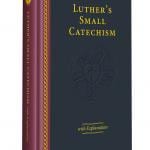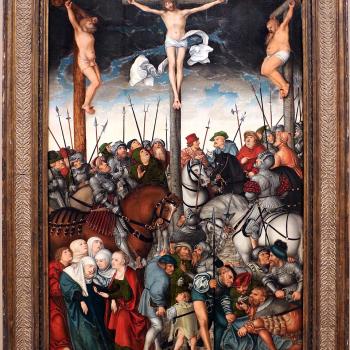Veggie Tales was a ground-breaker in Christian programming for children, telling Bible stories and lessons in life–in a fun and funny way–by means of animated talking vegetables. Videos of Bob the Tomato and Larry the Cucumber were staples in many Christian households in the 1990s, and, after the parent company Big Ideas went bankrupt in 2003 , the still-enormously popular franchise went through various owners and new versions.
In 2011, the creator of Veggie Tales, Phil Vischer made a remarkable confession: “I looked back at the previous 10 years and realized I had spent 10 years trying to convince kids to behave Christianly without actually teaching them Christianity.” He said that the old Veggie Tales were teaching moralism instead. For all of their humor, catchy music, and uplifting themes, the episodes were all about Law without the Gospel of Christ.
After DreamWorks bought the franchise, a stint on network TV proved even worse, as broadcasters toned down the series’ religious references. But a move to Netflix allowed the series to escape the censors. Just as Netflix liberated TV producers to employ more sex, violence, and bad language than the broadcast networks allowed, it liberated Veggie Tales to start referring to “God” again.
In 2016, Universal Studios took over DreamWorks animation, and a new deal has put Phil Vischer back in charge, with a full reboot of the series, which will premiere on the Trinity Broadcast Network (TBN) on October 22.
He talked about his plans, including his resolution to focus on the Gospel, in an interview in Christianity Today. From Kara Bettis, Phil Vischer Wants More Gospel in the Veggies:
Biblical truth is relevant across generations and across cultures. But will this new series address anything that is going to be specifically relevant to this generation?
We haven’t explained to kids how they’re part of a bigger story. The gospel has been turned so often into just tips for a better marriage, or tips to get through college without becoming an atheist. So kids are running to the Avengers, they’re running to Harry Potter, they’re running to Star Wars. They want to be a part of a big story, and we’ve lost the ability to excite them that the gospel is a big story. That’s what I’ve been trying to do with my most recent projects: Let’s tell the big story of the Bible and get kids excited about it again.
And you had talked in several interviews that you’d had regrets about teaching kids morality over the gospel.
It’s so much easier to teach morality. It’s so much easier to just tell a Bible story, pull a moral value out of it, and end with a Bible verse. There is value in that. That’s kind of where everybody starts. But if you stop there, you’re favoring the kids that are really good at following rules and you’re discouraging the kids who aren’t, because you never actually get to the message that leads to regeneration that leads to new life that leads to the fruit of the Spirit. And that’s the core of the gospel.
So, that’s what I wanted to do. I wanted to actually explain the whole faith to kids. Rather than just saying, “This is how the Bible wants you to behave,” saying, “This is the story that the Bible places you inside of, which is the gospel.” It’s better for the long-term health of the church and it’s better for kids and their sanity.
I know with your other popular show, What’s in the Bible?, you very intentionally moved in that direction. But with the new VeggieTales, do you have any intention of changing the show based on your new philosophy?
We initially settled on starting with the fruit of the Spirit and just going through the fruits of the Spirit one at a time. But not just treating it like behavior, treating it like life change and [asking] what is God’s role in this. You can only go so deep with cute, bouncy, talking vegetables.
Vischer goes on to say how the new series will focus on New Testament stories, such as Peter and John healing the crippled man in the Temple and Paul and Silas being delivered from the Temple. He said that he has just written an episode on the parable of the Prodigal Son. “As a 25-year-old when I started, I would have based that more around the son and his story, learning about how to say you’re sorry and how to come back. As a 50-year-old with more maturity, [I’m] telling the story of the father and the willingness to completely forgive that we find in God. This is a story about God. It’s not a story about us.”
I salute Vischer’s efforts and his new emphasis. I have always appreciated the wit and creativity of the Veggie Tales, which pass a major test of the quality of children’s entertainment, that they can also entertain the parents. But there are a couple of issues that may prove difficult to navigate.
First, just how will the funny vegetables convey the Gospel? Focusing on the fruits of the spirit (fruits! get it? how about vegetables of the spirit?) is good to do. But we cannot get to the fruits apart from the Vine. The Gospel, as such, is not just about God empowering us, or even about God forgiving us, though these are results of the Gospel. The Gospel has to be about Jesus Christ–His incarnation, His perfect life, His atoning death for our sins, and His resurrection–who justifies us when we are united to Him by faith.
Vischer says that a cardinal rule of the series is that “we’re not going to turn Jesus into a vegetable, because that’s just weird.” For that we can be grateful. But I’ll be curious to see how Vischer does present Jesus in that vegetable world. Unless he can, he won’t really be presenting the Gospel. Not that showing what forgiveness and God’s empowering look like isn’t worth doing for its own sake.
Vischer’s laudatory instinct that it would not be appropriate to show Jesus as a vegetable suggests another concern about the show. The Veggie Tale versions of Bible stories, by their nature, lack reverence. “Josh and the Big Wall” tell the story of the Fall of Jericho in terms of a slushy fight between grapes and peas, which is very funny, but it fails to do justice to the serious and terrifying magnitude of God’s judgment against the Canaanites. A sense of reverence–for God’s Word, for the realities it expresses, for our own lives and that of others, for the Christian life–I would argue, is one of those qualities that Christians today need to recover, both for themselves and for their children.
It is possible to be both humorous and reverent–note how G. K. Chesterton and C. S. Lewis pull that off–though it may often be necessary to keep them separate, while giving children exposure to both.
The Bible itself may have clues to how to present some of these things in its own figurative language. Perhaps Vischer could exploit the Bible’s own vegetative metaphors: Christ is the Vine. (Have Bob the Tomato and Larry the Cucumber discover how they came to exist and how they are still dependent on their vine.) Faith is a seed. (Have episodes about the parables of the Sower, the Mustard Seed, and the other plant-based parables.) Eternal life is like a plant whose seed must die before it blooms into an ever-greater life. (Writing about death like that could be part of an occasional use of animation to be serious and reverent in issues that children are definitely faced with.)
All of this would mean making Bob and Larry more like vegetables than they have been in the past, rather than just human beings without hands. And making them more like vegetables would be even funnier and a greater artistic achievement.
And here is how to present Jesus: Faith comes by hearing of the Word, so have the characters talk about Jesus, in so many words, without portraying Him as another fictional animated character.
Phil Vischer, as a true Christian artist, has the talent to make this work.
For a trailer for the new series, see this.
Image courtesy of VeggieTales /Big Idea Content Group. Used by permission.


















